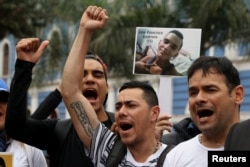Venezuela's newly established constituent assembly declared itself Tuesday to be above all other branches of government, including the opposition-led congress.
Assembly leaders said their laws and decisions trumped all others made by anyone else.
They said they were not intending to threaten anyone, but were just looking to coexist.
But the opposition-controlled congress vowed not to give up its power, even while the assembly threatens to strip it of any authority and scrap parliamentary immunity from opposition lawmakers.
Some opposition politicians complained Tuesday that they had been barred from entering the congressional chamber.
Nations refuse recognition
The 545-member assembly's chief task is to rewrite the Venezuelan constitution. Its members were chosen July 30 in what the United States has called a sham election. No Latin America country will recognize any decisions by the new assembly, nor will the U.S., Canada or the European Union.
Peruvian Foreign Minister Ricardo Luna hosted a meeting of his Latin counterparts Tuesday in Lima and declared Venezuela to be a dictatorship. He said Venezuela's only way out was to return to democracy by dissolving the constituent assembly, freeing all political prisoners and holding a new presidential election.
Peru has already withdrawn its ambassador from Venezuela and has suggested other nations do the same.
Also Tuesday, the U.N. human rights office said most of the 125 deaths of anti-government protesters had been caused by "widespread and systematic" excessive force by Venezuelan security forces
The U.N. agency said preliminary results of its investigation showed 46 demonstrators had died directly at the hands of Venezuelan security forces, while pro-government armed groups were responsible for 27 deaths. It was unclear what killed the others.
U.N. human rights commissioner Zeid Ra'ad Al Hussein said more than 5,000 people had been arbitrarily detained in Venezuela since widespread unrest broke out in late March. More than 1,000 are still in custody.
Zeid's office reported allegations of torture, including electric shocks, beatings with sticks, hanging detainees by their wrists, and threats of sexual violence against their families.
Stability vs. dictatorship
Venezuelan President Nicolas Maduro has said the new constituent assembly will restore peace and stability to the country. The opposition says the assembly is packed with Maduro supporters, including his wife and son, and will turn Venezuela into a socialist dictatorship.
The assembly's first major move last week was to dismiss Attorney General Luisa Ortega, a former Maduro ally turned vociferous opponent. That brought a swift reaction from the Latin American trade bloc Mercosur, which suspended Venezuela's membership indefinitely.
The collapse in global energy prices along with government corruption have sent oil-rich Venezuela spiraling into an economic and social catastrophe.
VOA's Carol Guensburg and Alvaro Algarra contributed to this report.





